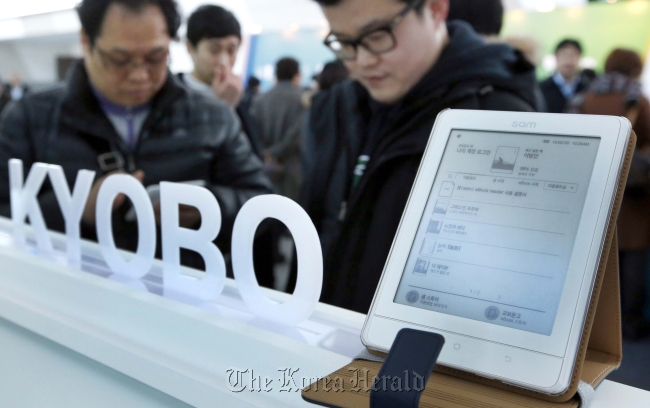Digital yet to turn page on paper books
One in 10 people read e-books, but many still skeptical about going all-digital
By Korea HeraldPublished : March 6, 2013 - 20:28
Thirty-four-year-old office worker Chung Hye-sun has started reading e-books, readable on computers and other electronic devices.
She enjoys reading business management books on her iPad while commuting and whenever possible.
“E-books are convenient. Instead of having to carry books in a large bag, all you need is a light and thin tablet PC or other gadgets in my purse,” she said. “You can underline important passages, press the ‘search’ tab to find the exact sentences or parts you need. Bookmark, dictionary and other functions are also available by pressing the screen. I just love it,” she said.
Many Koreans like Chung have started replacing paper books with digital publications.
She enjoys reading business management books on her iPad while commuting and whenever possible.
“E-books are convenient. Instead of having to carry books in a large bag, all you need is a light and thin tablet PC or other gadgets in my purse,” she said. “You can underline important passages, press the ‘search’ tab to find the exact sentences or parts you need. Bookmark, dictionary and other functions are also available by pressing the screen. I just love it,” she said.
Many Koreans like Chung have started replacing paper books with digital publications.

According to a Ministry of Culture, Sports and Tourism survey of 2,000 people aged 10-69, 14.6 percent are already reading e-books, which translates to the average Korean reading 1.6 digital books a year. Younger and more educated people are more likely to be an e-book user, the report showed.
About 38.3 percent enjoyed literature, followed by sports and leisure, biography, self-help, cooking and religious content. About 25.3 percent said they read for fun, while intellectual desire, self-development and practical aims followed.
“We have seen the e-book market increase in the past couple of years,” said Chris Choi, who runs an e-book publishing company, ebooks Pub. Choi, who started his business in 2010 and released his first e-book last August, said he had seen sales soar 30-fold in less than eight months.
Choi said the widespread use of smartphones, iPads and other digital gadgets had contributed to the growth. The ministry research also noted that 44.1 percent of e-book users read publications with smartphones followed by personal computers, tablet PCs and e-book readers.
Another factor driving the market expansion is the growing amount of digital content available.
“These days, many of the books published offline are released online, too,” said Jung Dong-youn at Woongjin Think Big, a major publisher. His company has more than 900 e-books in online outlets including yes24, Ridi books, Kyobo and others.
“E-book publication is a great opportunity because the paperless business costs less but guarantees an equal amount of income to both the company and the author. Combined with users’ convenience, I think there is a great future,” Choi said.
The business is moving quickly, too. Kyobo Book Center, the country’s largest bookstore, recently released Sam, its own e-book reader, and launched a leasing program, loaning out e-books on a fixed-payment basis.
A total of 57 e-book publishers established Korea eBook Publishing Coop last month to cooperate on various issues from content development to overseas expansion, including translation and joint marketing.
“We will be aggressive about raising public awareness,“ Choi said.
But skepticism remains. The distribution channels are limited ― the majority of e-book publishers have yet to make it onto iBook or iTunes, a market for Apple gadget users, and the world’s largest online bookstore Amazon.com has yet to offer Korean-language products.
“Except for a few online stores, there aren’t many ways for people to access online content,” said Kim Ha-yeon, another e-book user.
Whether the market has great potential also remains uncertain. The ministry report noted that 50.6 percent of the surveyed people said they would continue to read mainly hard copy books in the future, with 49.6 percent of non-e-book users saying they had no plans to try digital books in the future, double the number of 19.8 percent who were positive about trying digital titles.
“I love the feeling of turning the pages, which is a special experience. E-books are nice but paper books will always be closer to my heart,” Chung said.
“We will need more digital content, wider provision of e-book readers or other gadgets and to allow people try reading e-books in order to cultivate the relevant culture,” the ministry report concluded.
By Bae Ji-sook (baejisook@heraldcorp.com)
-
Articles by Korea Herald










![[Hello India] Hyundai Motor vows to boost 'clean mobility' in India](http://res.heraldm.com/phpwas/restmb_idxmake.php?idx=644&simg=/content/image/2024/04/25/20240425050672_0.jpg&u=)








